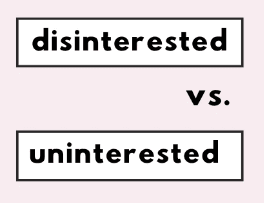Decoding the Nuances and Variations: Disinterested vs. Uninterested
Contents

Words that look or sound alike can confuse people who are learning English. This is one of the tricky parts of the language that makes learners puzzled.
Have you ever found yourself stuck in such a situation? For instance, were you ever unsure whether to use 'disinterested' or 'uninterested' in a sentence? You're not alone! Many students and professionals struggle to tell the difference between these two terms. But don't worry! We're here to clear up this confusion.
Today, we'll be talking about the meanings and usages of 'disinterested' and 'uninterested'. Knowing what they mean and when to use them, can help you in telling them apart and use them correctly. Keep reading for explanations that will make it clear once and for all!
Disinterested vs Uninterested: Definitions and Examples
First, let's break down the definitions of 'disinterested' and 'uninterested'.
'Disinterested' refers to a person who is impartial or unbiased, like a judge or referee in a game. Here’s an example: “The judge remained disinterested in the debate between the lawyers.”
'Uninterested' describes someone who lacks interest or enthusiasm in a particular matter. For instance: “She was uninterested in the football match happening on TV.”
Here is a table for a better understanding. It also gives some examples of disinterested and uninterested:
Word | Meaning | Examples |
Disinterested | Being impartial or unbiased | "The disinterested judge decided the case purely based on evidence." "She remained disinterested in the gossip." |
Uninterested | Lacking interest or enthusiasm | "He remained uninterested during the entire lecture." "He seemed uninterested in joining the team's celebration." |
Remember that knowing the difference between disinterested and uninterested can improve your spoken English. So, it’s essential to understand their definitions and use them correctly. Practice using these terms in sentences until you can use them with ease.
Tips for Remembering the Difference
Let's simplify remembering the difference between 'disinterested' and 'uninterested' with some quick tips:
Associate: Link 'disinterested' with 'decision'. A disinterested person can make unbiased decisions since they have no personal stake.
Visualise: Picture 'uninterested' as being under a cloud of boredom. An uninterested person would like to be somewhere else. They find the current situation dull.
Mnemonic: Remember these word pairs: "Disinterested: Detached; Uninterested: Unimpressed."
Practice: Practice makes perfect! Regularly use these words in your conversations and writings.
Quiz Yourself: Take self-tests to reinforce your understanding. You can use the disinterested vs uninterested quiz below to check your progress.
Visit this blog to learn more ways to improve and expand your vocabulary: Spoken English Words List To Learn English Under 15 Days!
Explore such resources at Clapingo to enhance your skills. It will boost your confidence and help you communicate with more confidence.
Test Your Understanding with Disinterested vs Uninterested Quiz

You've learned the basics of the meanings and usages of 'disinterested' and 'uninterested'. Now it's time to see how well you have understood them. This quick quiz will help you see how well you've understood the concept.
1. Which of these sentences uses 'disinterested' correctly?
a) I was disinterested in the cricket match because I don't like sports.
b) The referee was disinterested and ensured a fair game.
2. Choose the correct word for this sentence: "She seems _____ in the computer programming."
a) disinterested
b) uninterested
3. If you do not care about something, would you be:
a) Disinterested
b) Uninterested
4. Which is the right usage: "As a judge, he needs to remain ______ during the trial."
a) Disinterested
b) Uninterested
5. Fill in the blanks: "The ______ teacher graded the papers impartially. The ______ students doodled in the margins."
a) disinterested, uninterested
b) uninterested, disinterested
Reflect on your choices and check your answers here:
Answers: 1-b, 2-b, 3-b, 4-a, 5-a
This quiz is a practical tool to help you remember the difference between these words. Continue practising these examples in real-life situations to enhance your spoken English skills!
To avoid making vocabulary mistakes, check out this YouTube video by Clapingo:
The Importance of Correct Usage and Accurate Vocabulary
Knowing how to use words like 'disinterested' and 'uninterested' can affect how you interact with others. This includes both personal and professional communication. For example, let's say you're in a meeting with an international client. If you use 'uninterested' instead of 'disinterested', it might seem like you're not interested in the meeting. This could lead to misunderstandings and lost deals.
But, using these words correctly in casual conversations can make a good impact. If you use them while discussing a movie with your friends, you can show off your language skills. This can make you look more interesting.
Figuring out these language difficulties can be tough if you don't have the right help. That's where Clapingo's personalised coaching comes in handy. Clapingo's expert tutors, explain such differences but help you use vocabulary correctly. Clapingo also offers one-on-one sessions in your native language. This helps in making sure that you master confusing words like 'disinterested vs uninterested'.
Summing Up
In this exploration of disinterested vs uninterested, we have discussed the usage of these confusing words in detail. We have discovered that 'disinterested' means being impartial or neutral. We also saw that 'uninterested' shows a lack of interest or concern. By looking at examples, we've seen how the context determines which word to use.
But this understanding alone is not enough. The real key lies in applying these learnings in your daily communication. So keep challenging yourself to use 'disinterested' and 'uninterested' correctly.
Continue this learning journey with personalised coaching sessions from Clapingo. These coaching sessions will help you reach your goal of confident and fluent English communication. Remember, every step you take brings you closer to mastering English fluency.
FAQs
1. How do you use disinterested and uninterested?
When referring to someone who is impartial or unbiased, use 'disinterested'. If someone lacks interest or is indifferent about something, use 'uninterested'.
2. Who is a disinterested person?
A disinterested person is someone who does not have any personal involvement or bias. They remain neutral or objective in a situation.
3. Can you provide some disinterested vs uninterested examples?
Sure! "The umpire must be disinterested during a cricket match," means he should not favour any team. "The students were uninterested in the lecture," means they were not interested in it.
Comments
Your comment has been submitted